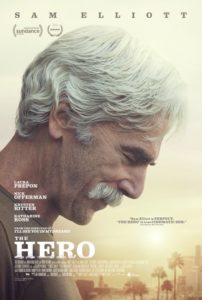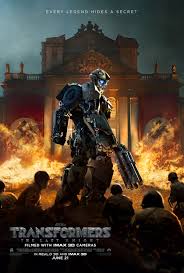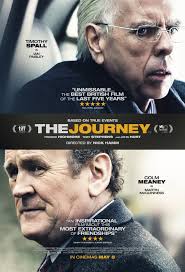Interview: Writer/Director/Editor Brett Haley on Sam Elliott and “The Hero”
Posted on June 21, 2017 at 10:00 am

Lee, the actor Elliott plays in the film, is neither as successful or as stable as Elliott is in real life. In the film, he is something of a has-been, with an estranged daughter and an ex-wife (played by Elliott’s real-life wife, Katharine Ross). Lee very much wants to be cast in a particular role, and in one of the movie’s highlights we see him prepare for an audition by reading lines with his friend and drug dealer, played by Nick Offerman. “We see him be an amazing actor when he’s rehearsing for the audition,” Haley said, “but the way he behaves in the actual audition and his carelessness with his life shows a lack of discipline and professionalism that I think is part of being a good actor. Auditioning and acting are two very different skills. Being a great actor doesn’t always mean that you’re good at auditioning. Auditioning is a whole separate skill. Even the most amazing actors blow an audition because of the pressure or because something is going on in their life. And being a good professional is a great thing but people like Marlon Brando and Orson Welles who are some of the greatest movie stars and actors ever, you could say that they were not always the most professional but I don’t think that makes them any less of an incredible actor. Being difficult or not having a good work ethic, these are human qualities that I don’t think have anything to do with being an actor. It’s really fun to see that Lee still has some gas in the tank as a performer, even if he does not have the discipline to handle the audition.”
Lee is invited to accept a lifetime achievement award from a group of western fans. He brings a much younger woman named Charlotte (Laura Prepon) and they get high together on the way there. “The event is something that’s meant to be seen as initially as disappointing, certainly not the Oscars or the SAG or the Golden Globes. It’s a small society of people that want to keep the western alive, that still love the western. Because Lee is on drugs, he becomes more open to the love that these people have for him, he accepts it. Having fun with it and not taking it so seriously and just being in the moment allowed him to then embrace the love of his fans and understand that it does mean something in the end to be loved by anyone, to be remembered even if it is for just one movie.”
I asked him about the unusual combination of writing, directing, and editing. “They’re all the same basic idea, shaping the story. You’re writing when you write it and you’re writing when you shoot it and you’re writing when you edit the film. You’re rewriting all the time. You’re always working on honing the story and making the elements work. That’s been part of my process since I was a kid making movies. I’m certainly thinking as I film of how to protect myself in the edit.”
Actors who have worked with Haley have said that they appreciate his flexibility in giving them a chance to try different approaches. “That’s all you’re doing as a director to a large degree is collecting material so you have options. You can’t be too set on getting it just one way. I’ve learned over the years you need to get as many ways as you can because you could be wrong and I like being able to play with it in the edit and have fun with it. I know what I want but I also think my actors will do their best when you let them bring their own interpretation to certain things. But I certainly think that we’re all on the same page before we get on set. That’s a really important distinction, so it’s not like they’re doing the scene in a completely different way that I would initially want. So by getting on the same page and then on set we are able to play and try new things and experiment.”
Haley said it was “a real treat” to have Ross play the role of the ex-wife. “Katharine is an icon in her own right, an amazing actor and an amazing woman. To have a real life married couple who play exes made it a lot of fun to play with because there’s a lot of history between Sam and Katherine and I think you can see it come across off screen. I think it was a little weird but also fun for them to play a couple with a lot of history and their real life experience informed a lot of the great work that goes on between them.”
Interviewer: As a writer you kept a lot of information away from us, you know I often think that’s the difference between an independent film and a studio film is how much they feel that they have to explain to you and you didn’t give us a lot of information about what happened in that relationship or what happened in a relationship with our we have a general sense of his not being there but how do you decide sort of where to, how much information to give the audience?
He does not overdo the exposition and backstory in his films. “I think about it in terms of how people actually talk to one another in real life. People don’t do monologues about their backstory when they’re seeing their ex-wife or their daughter or ‘let me list all the ways I was terrible to you’ or ‘you remember that time I was bad.’ I know that audience is a really smart and I think they understand what could have caused the rift between them. It’s clear that he was an absent guy, a selfish guy and I think that’s all they need. I think that the more specific you get when it comes to a back story it just becomes sort of a cheat, it’s telling the audience how to feel instead of letting them just simply feel. I always tend to go for the more subtle approach and let the actors’ faces tell the story rather than my words or some kind of exposition do the work.”
Haley was sensitive to avoiding the usual dynamic of a movie relationship between an older man and a younger woman. “I thought it would be interesting to see this character that Laura I think brilliantly plays, be more of the pursuer. He’s not really sure if he can trust her or not you’re not really sure what her intentions are with Lee. I wanted to play with that. I wanted Lee to be weirded out and cautious and just not comfortable with the situation and I thought that was a really fresh take. That’s what Mark Basch and I like to do. We like to take those cliches and we like to turn them into more honest and more appealing circumstances and characters. So it was a challenge to get right but I’m very proud of that relationship and how it comes off. It goes in very surprising places. It’s not as simple as beautiful young woman, old guy ending up together; it’s a lot more than that.”


 Nick Hamm directed “The Journey,” an imagined story about real events. Two bitter enemies, Protestant Ian Paisley (played by Timothy Spall) and Catholic Martin McGuinness (played by Colm Meaney), the bitterest of enemies, unwilling even to sit in the same room, managed to do what no one else had done for decades — to find a way to create peace in Northern Ireland after years of bloody battles. In real life, it took years. In the movie, time is compressed into one ride to the airport, shared by the two men and listened in on by a small group of very anxious government officials. But the spirit and even the language of the film accurately conveys the enormity of the situation and the statesmanship of the two men who discovered that no religion or political dispute could justify the terrible losses of The Troubles. In an interview, Hamm talked about the film’s relevance to today’s hyper-partisan conflicts around the world.
Nick Hamm directed “The Journey,” an imagined story about real events. Two bitter enemies, Protestant Ian Paisley (played by Timothy Spall) and Catholic Martin McGuinness (played by Colm Meaney), the bitterest of enemies, unwilling even to sit in the same room, managed to do what no one else had done for decades — to find a way to create peace in Northern Ireland after years of bloody battles. In real life, it took years. In the movie, time is compressed into one ride to the airport, shared by the two men and listened in on by a small group of very anxious government officials. But the spirit and even the language of the film accurately conveys the enormity of the situation and the statesmanship of the two men who discovered that no religion or political dispute could justify the terrible losses of The Troubles. In an interview, Hamm talked about the film’s relevance to today’s hyper-partisan conflicts around the world.